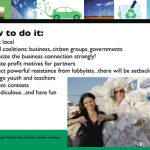Reducing single-use plastics
For businesses, communities, citizen groups, and the health of our ecosystems, it’s a moral imperative that we reduce our use of single use plastics. They require the extraction of fossil fuels and the processing of petroleum, transportation across thousands of miles, and then they’re in use for 1-5 minutes and last a thousand years or more. They leach chemicals that can end up in our food, and wildlife mistakes plastic bags for potential prey items like jellyfish, and end up ingesting them.
Lobbying groups like the American Chemistry Council, which represents chemical manufacturers, would like us to believe that recycling is the best option. Recycling plastics is, at best, a losing proposition. Plastics are not easy to recycle, as the chemical composition breaks down and is not so easily formulated into products with great flexibility. About 5% of plastic bags get recycled, with many millions ending up polluting our environment, and the main reason is that there is simply not much of a market for the recycled plastic material.
So what’s to be done? This video, taken during our June 2012 webinar (you can download the slides from that link) on reducing single use plastics, gives great strategies for all stakeholders. The panel included Priti Ambani of Ecopreneurist, Suzette Bergeron of Bulletin Bag, and yours truly. Enjoy, and feel free to embed on your own site to spread the word.
Join our newsletter (in the sidebar) if you want to be notified of this and other similar events in the future!
Scott Cooney
Scott Cooney (twitter: scottcooney) is an adjunct professor of Sustainability in the MBA program at the University of Hawai'i, green business startup coach, author of Build a Green Small Business: Profitable Ways to Become an Ecopreneur (McGraw-Hill), and developer of the sustainability board game GBO Hawai'i. Scott has started, grown and sold two mission-driven businesses, failed miserably at a third, and is currently in his fourth. Scott's current company has three divisions: a sustainability blog network that includes the world's biggest clean energy website and reached over 5 million readers in December 2013 alone; Pono Home, a turnkey and franchiseable green home consulting service that won entrance into the clean tech incubator known as Energy Excelerator; and Cost of Solar, a solar lead generation service to connect interested homeowners and solar contractors. In his spare time, Scott surfs, plays ultimate frisbee and enjoys a good, long bike ride. Find Scott on Google Plus
One Response to Reducing single-use plastics
Leave a Reply Cancel reply

Get your signed copy of
Build a Green Small Business (McGraw-Hill)!
Or...talk with the author!
Click here to schedule an hour consultation.
 Green franchise opportunities:
Other green business ideas
Green franchise opportunities:
Other green business ideas
- Healthy Fast Food
- Farmer's Market
- Personal Trainer & Diet Planner
- Juice Bar and Smoothie Café
- Green Building Materials Store
- Permaculture and Urban Farming
- Edible and Organic Floristry
- Energy Efficiency Auditing
- Ecotourism and Sustainable Travel Planner
- Sustainable Coffee House
- Consignment Shop for Kids Clothing & Toys
- Natural Foods Co-op
- Sustainable Food Prep and Cooking Instruction
- Food Plant Nursery
- Mesh Network Telephone and Internet Company
- Drive-thru Coffee Stand & Espresso Shop
- Eco-Friendly House Cleaning Service
- Organic Backyard Garden Landscape Design
- Green Bed and Breakfast (B&B)
- Sustainable Mobile Food Vendor
- Biodiesel Cooperative
- Eco Friendly Pool and Spa Cleaning
- Green Wedding and Sustainable Event Planner
- Organic Farm
- Gift Basket Service
- Pedicab Company
- Used Books Vending Machines
- Organic Day Spa
- Restaurant Food Delivery Service
- Used Bicycle Retailer
- Landscape Maintenance in Arid climates
- Organic Food Delivery Service
- Outdoor Gear Consignment Shop
- Eco Concierge Service and Relocation Specialist
- Organic Community Supported Agriculture
- Sustainable Property Management
- Residential Solar




most of the credit cards for pepole with bad credit will carry some fees. If you have good credit you will probabaly not have to pay any fees at all. Because of the fees attached to bad credit cards the interest rate is usually pretty low, around 10% for some. Of course with good credit the interest is also pretty low with out the fees. You can view cards and compare them for both good or bad credit at It will show interest rates and year fees if applicable.